Swept into darkness, Deek fights to survive while his family—and their love—reach for him from both sides of the unseen.
Previous Chapters: Part 1 | Part 2 | Part 3 | Part 4 | Part 5 | Part 6 | Part 7 | Part 8 | Part 9 | Part 10 | Part 11 | Part 12 | Part 13| Part 14 | Part 15 | Part 16 | Part 17 | Part 18 | Part 19 | Part 20 | Part 21 | Part 22 | Part 23 | Part 24 | Part 25 | Part 26 | Part 27 | Part 28
* * *
“Through love the bitter becomes sweet,
through love the copper turns to gold.”
— Rumi, tr. Nicholson
Grave Marker
Sanaya pelted downhill, her shoes slipping on loose gravel and damp tufts of grass. The cold night air burned in her lungs, and the smell of wet earth rose around her. Every few steps she threw out her arms for balance, her breath ragged in her ears, her heart pounding hard enough to drown out everything but the whisper of wind in the trees. She tried all at once to see her footing in the dark, not lose her balance on the steep slope, and decide who—if anyone—she should call.
Though she felt the urgency of the situation, she was not panicked, perhaps because she was not convinced that her father was, in fact, in the river. It wasn’t that she didn’t trust Amira’s vision. It was just that Amira had never had a vision before. All of Sanaya’s life, she’d known that Mom had a second sense, but it wasn’t any great, world-changing talent. Mom knew when the phone was about to ring, and when she and Baba were apart she would get a feeling when he was unwell. Mom didn’t consider it anything special, and referred to it modestly as female intuition.
Amira’s “feelings” were stronger. Not only did she know when the phone was about to ring, but who was calling as well. One time they’d been in the car, stopped at a red light—Mom driving, Sanaya and Amira in back. When the light turned green Amira leaned forward, seized Mom’s arm and said, “Don’t go yet.” A second later a drunk driver ran the red and t-boned the car in front of them.
So yes, her sister had a talent. But to be able to say that Baba was in the river… That was a step beyond what Sanaya’s rational mind could accept.
Amira ran ahead of her, galloping down the hill like a gazelle, her dark hair flying behind her. Sanaya couldn’t fathom how the girl could move so fast without tumbling head over heels. The slope funneled them toward the sound of rushing water—low, steady, and menacing, like a growl in the dark.
She reached the bank and slid down a muddy trail, her hands sinking into cold muck as she steadied herself. The river smell hit her—damp reeds, algae, something metallic and raw. At the bottom, Amira stood on a narrow sandy beach, breath misting in the moonlight, yanking off her shoes and jacket with trembling hands.
“What are you doing?”
“I’m going to look for Baba!” Amira’s face was pale, her eyes wide. She took a step toward the river.
Sanaya seized her sister’s arm. “No! No way. Look at it!” She jabbed a finger at the broad, ink-black expanse of water. The current moved fast, eddies flashing dull silver under the moon. It hissed against the bank and tugged at stray branches floating past, as deadly and sinuous as a giant boa constrictor.
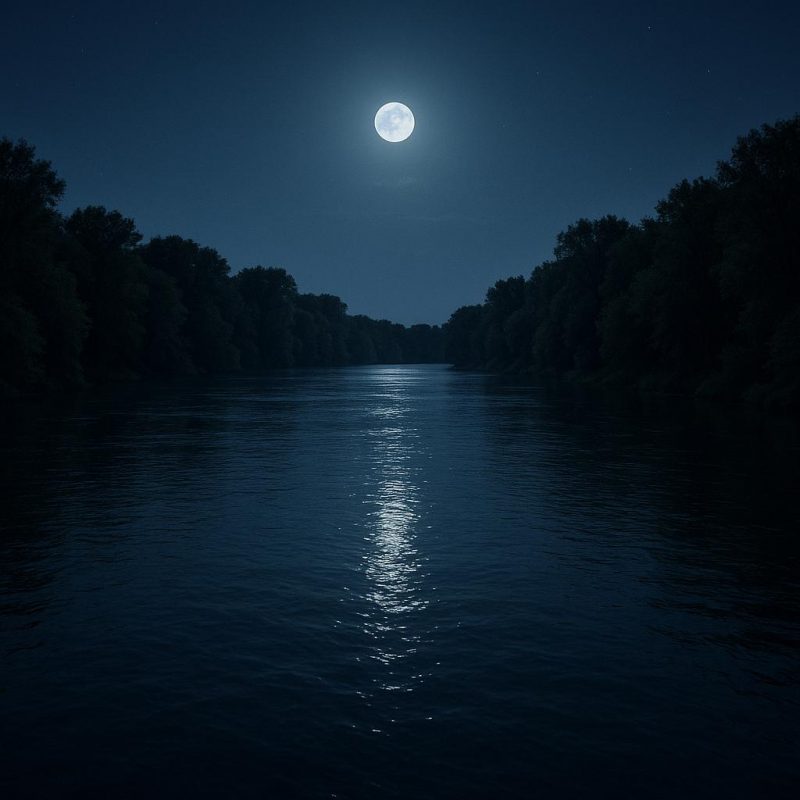
“That water is freezing! If you go in there you’ll drown.”
“We have to do something!” Amira screamed, her voice breaking. “He’s drowning.”
“We don’t know that! He might still be up by the house, maybe he went for a—”
Her words died as she saw a large rock at the top of the beach. Baba’s wallet and keys sat atop it, gleaming faintly in the moonlight. Amira was right. Her father was in the river.
“We’ll call 911,” she declared, even as a wave of hopelessness washed over her. And we’ll search along the shore. But we’re not going in the water.”
Sanaya couldn’t pull her eyes from the stone with the wallet and keys. It felt like she was looking at a grave marker. The night seemed to press in tighter, the roar of the river swelling until it filled her chest.
“Fine. Come on then!” Amira turned and began working her way along the bank, her small flashlight beam jittering wildly as she called out into the dark, “Baba! Baba!” The river swallowed her voice and carried it away downstream.
Get Up to Get Down
Deek burst to the surface choking, the river black and endless around him. The cold cut through his clothes like a thousand knives. He kicked weakly, lungs burning, every breath tasting of mud and iron. The current dragged him, tumbling him sideways, then downward again. He fought his way up, gasping for air. The roar of the river filled his head — not just sound but pressure, a living force pulling him into its depths.
Something struck his hip — a jagged rock hidden beneath the surface — and the pain flared white-hot, blotting out everything. He cried out, but the sound was swallowed by water. Still, the pain anchored him, reminded him he was alive. Kicking with what strength remained, he spotted a dark shape hanging over the river. It was a low-hanging tree branch! He lunged toward it. His muscles screamed, his breath came in ragged bursts, and his hands felt like stone. Somehow, impossibly, he reached it and thrust his hands upward, grasping. They closed around the rough branch and he clung there, the water still up to his neck, and his feet not touching the bottom.
Above him, the clouds broke. The stars spilled across the sky, sharp and clear, as bright as neon. He blinked the water from his eyes and found himself staring at a constellation he hadn’t thought about in years — the one his father had pointed out when he was a boy. That’s yours, his father had said. The lion watching over the travelers.
His grip faltered. His hands came apart, sliding off the coarse branch as if it had turned to glass. The current seized him again, dragging him backward, spinning him into the dark. He went under.
The world dissolved.
In his mind, he was standing on the planet Rust.
The sky was copper-red. The wind carried the dry scent of old metal. All around him, the cities of the giants lay in ruin — broken towers and rusting bridges stretching into emptiness. No movement. Only silence.

He thought he was alone. Then he saw the fire.
It flickered beneath a vast tree. Three figures sat cross-legged around it, a small pot bubbling over the flames. The smell — something savory and sweet — reached him.
Rabiah al-Adawiyyah looked up first. Her eyes shone like polished amber. “Assalamu alaykum, Asad,” she said softly. “The Lion of Islam. The Lion of Love.” She turned back to the pot and dipped a wooden spoon, tasting the broth as if his arrival had been expected.
Across from her sat Queen Latifah, wrapped in a cloak the color of deep plum. “I’m just here for the food, brother,” she said. “But I’ll say this — you got to get up to get down.”
Deek blinked, trying to make sense of it all. “What—where—”
Before he could finish, a third figure rose to her feet. Rania. Her hair was loose, drifting like ink in the red wind. She crossed the small space between them and took him in her arms. He felt her warmth, the familiar scent of her skin, and for the first time since the river, he wasn’t cold.
She drew back, cupped his face in her hands. Her palms were warm, strong. She said nothing. Her eyes were wide and dark, but within them he saw the stars — and there, shining in their depths, the same constellation. The lion watching over the travelers.
The pressure of her hands grew. Not painful, but insistent, as if she were trying to hold him in place. He tried to speak, to ask what she meant, but his mouth wouldn’t move. The warmth became heat. Her grip tightened until it was unbearable, light pouring from her fingers—
—and he was falling again, the river claiming him.
Making Calls
Sanaya scrambled through brambly bushes that clawed at her legs, scratched her hands until they bled, and tried to snatch her hijab from her head. Thank goodness for Baba’s leather jacket at least. She called 911 on the run, panting, and gave them a breathless description of her location. They said they would send a rescue team, but it would take a half hour. How useless.
Amira was up ahead, moving faster, shouting for Baba at the top of her lungs.
The mud sucked at Sanaya’s shoes, while rocks moved beneath her feet, threatening to turn her ankles. She debated with herself whether to call Mom. Her mother had been depressed and in pain, and Sanaya didn’t see the sense in adding to her problems until they knew for sure what had happened. The question resolved itself when the phone rang in her hand. It was Mom, of course.
Working to keep her voice calm and make it sound like everything was under control, Sanaya explained what had happened. At Mom’s insistence, she gave her the house address and the directions down to the beach.
The Sound of Palestine
Zaid Karim sat cross-legged on the thin carpet of the Atlanta airport chapel, having just finished praying Ishaa. The faint scent of disinfectant hung in the air. Beyond the door came the muffled hum of the terminal, but here it was still.
He was on his way home from Jordan. He’d gone to help his aunt bury her baby son, and had made a side trip to the Gaza Camp to deliver a large cash donation to the UNRWA representative.
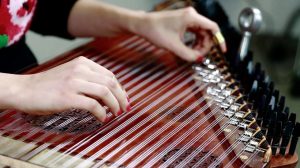
The qanun
At the camp’s food distribution center, he had found a family of musicians performing for the refugees. The father sat on an overturned crate, plucking an oud, while his teenage daughter played the qanun and sang, her voice a small flame in the cold air. Two boys clapped rhythmically beneath her melody, laughing when they missed a beat.
The man’s wife and two other children, Zaid learned, had been killed in an Israeli airstrike months before. Yet there was no lament in the music. The song was about the orange harvest — how the whole village once turned out to gather the fruit, singing and calling to each other through the groves, their baskets heavy with organic gold.
The sound of the qanun in particular was the sound of Palestine itself – joyful, defiant, delicate but alive. It made Zaid’s heart soar. He stood among the refugees, humbled by their strength. This, he thought, was sabr.
His phone vibrated beside him, interrupting the memory. Rania. There was a sign on the wall that said no cell phone usage in the chapel, but there was no one else here at the moment, so Zaid answered the call.
“Assalamu alaykum Rania, what’s up?”
“Zaid,” she said. Her voice was tight. “I need your help. Deek is lost.”
“Lost? What do you mean—”
“At the San Joaquin. The river.” Her voice caught. “He’s gone. Meet me there, as fast as you can. I will text you the -”
“Rania, listen. I’m in Atlanta, I just—”
The line went dead.
Zaid lowered the phone, his pulse hammering. Then he raised his hands.
“O Allah, You are the Giver of life and the Rescuer of the lost. Grant Deek strength to hold fast, light to guide him, and mercy to carry him to safety. You know what we do not know. Protect him, Ya Rahman. Bring him back.”
He remained that way, palms open, as the sound of a departing plane rumbled through the floor beneath him.
Holding On
The vision of his wife, and the heat of her palms against his face, gave Deek an iron resolve he did not know he possessed. He felt utterly drained, yet he found the strength to keep his face above the swirling, racing water, even as it carried him along at a mad pace.
Again, a dark shape loomed ahead, not above the river this time but within it. It was a rock jutting from the current like the fin of some sleeping beast. With all the strength he had left, he swam toward it, not so much stroking with his arms as flailing them at the water. Yet he reached it. His chest slammed into the cold granite, arms wrapping around it. He clung there, trembling, his cheek pressed to the slick surface. His whole body shook with cold. He had lost feeling in his legs. His fingers would not close.
He clung there, not knowing why he bothered to continue trying. No one was coming for him, and he could not reach the shore on his own. He was going to die here. If that happened, he would take comfort in the fact that he’d raised two smart, strong daughters. And he’d done some good, hadn’t he? He’d donated large sums of money to important causes, and had saved Dr. Rana’s daughter, by the will of Allah. He’d started the process of establishing an Islamic school, and had secured his family’s financial future. All of that would continue. The trusts he’d set up would continue to pay his family, and the family office that the Indian kid was building – what was his name? Deek couldn’t think, couldn’t remember anything. The Indian kid, the family office, would do something…
But his wife. Rania didn’t care about the money, she was pure-hearted. She was better than he deserved. His dear wife was the saint of the family; she was the sun shining its warmth, and he was an anchor around her neck. Or maybe the anchor was around his neck, and it was this river pulling him down. All he knew was that Rania needed him. So he held on. Without hope, without warmth, without feeling in his hands, he held on.
***
Come back next week for Part 30 inshaAllah
Reader comments and constructive criticism are important to me, so please comment!
See the Story Index for Wael Abdelgawad’s other stories on this website.

Wael Abdelgawad’s novels – including Pieces of a Dream, The Repeaters and Zaid Karim Private Investigator – are available in ebook and print form on his author page at Amazon.com.
Related:
Asha and the Washerwoman’s Baby: A Short Story
The Deal : Part #1 The Run
The post Moonshot [Part 29] – Holding On appeared first on MuslimMatters.org.

 , they said, was compassionate, tolerant, patient, merciful, endlessly forgiving—more yoga instructor than warrior, more monk than statesman. And so, every Friday sermon, interfaith dinner, and panel discussion circled back to the same soothing line: “What would Muhammad do?”
, they said, was compassionate, tolerant, patient, merciful, endlessly forgiving—more yoga instructor than warrior, more monk than statesman. And so, every Friday sermon, interfaith dinner, and panel discussion circled back to the same soothing line: “What would Muhammad do?” “What is the matter with you that you do not fight in the cause of God and for those oppressed men, women, and children who cry out, ‘Lord, rescue us from this town of oppressors!’” [Surah An-Nisa; 4:75]
“What is the matter with you that you do not fight in the cause of God and for those oppressed men, women, and children who cry out, ‘Lord, rescue us from this town of oppressors!’” [Surah An-Nisa; 4:75]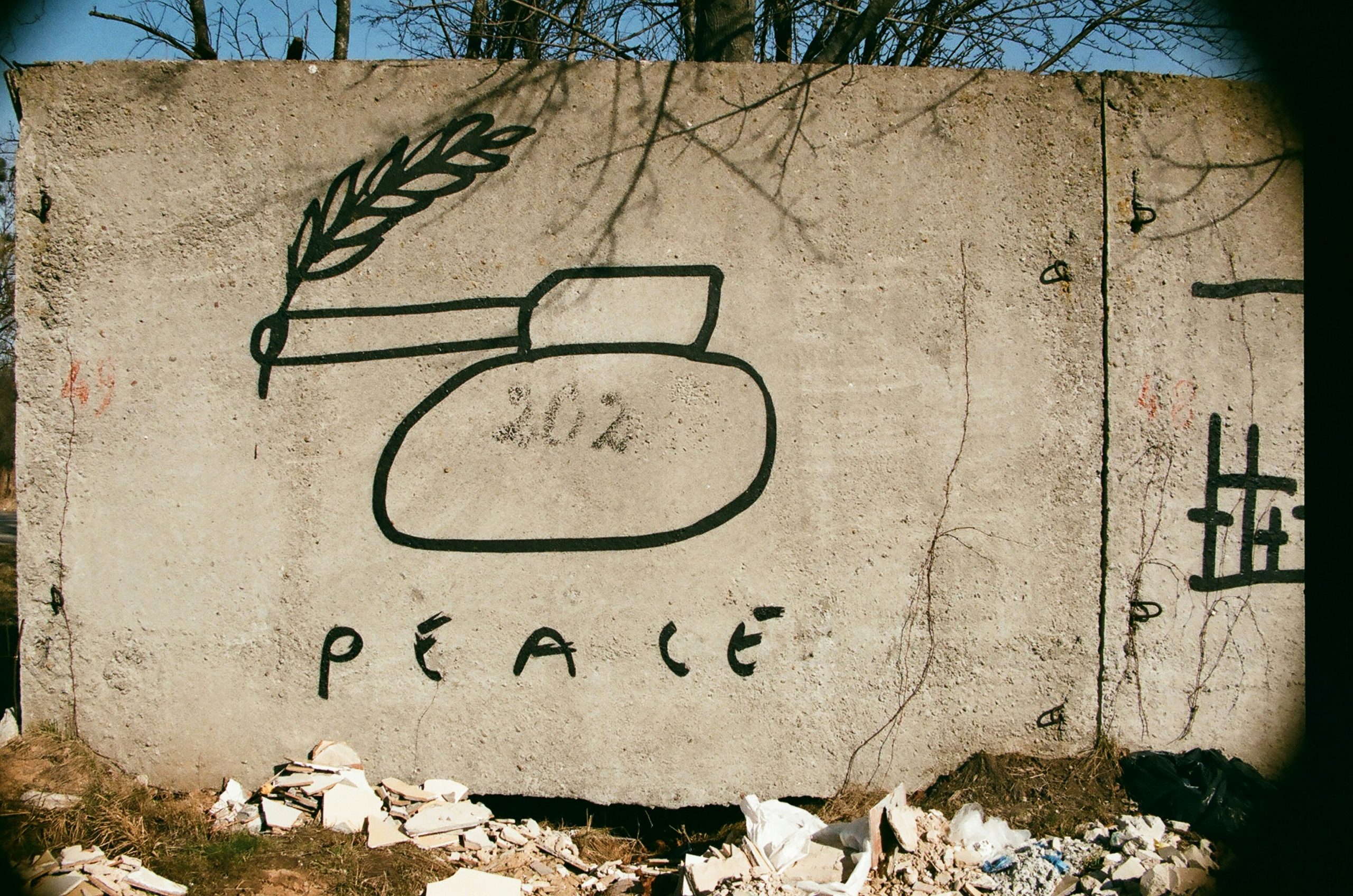
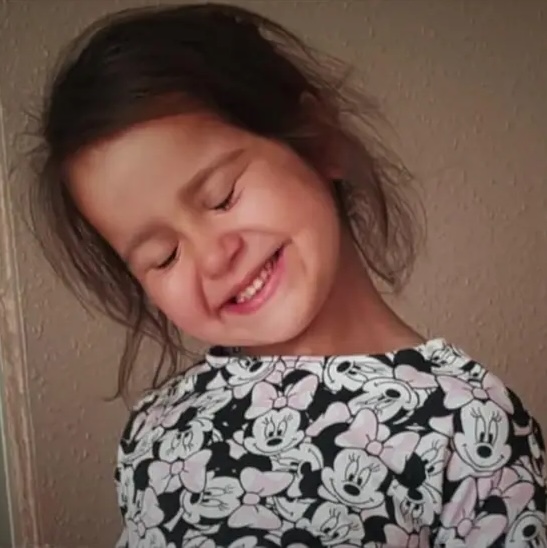 Sara Sharif
Sara Sharif 



 path. Gwi-Ma represents Iblis, while his demon army symbolizes the many human and jinn shayateen who work to lead us astray. It is tradition that protects us from this. Our tradition also strives to preserve lineage–the various Islamic sciences and the various Sufi Tariqas that are protected by chains of transmission that lead all the way back to the Prophet Muhammad
path. Gwi-Ma represents Iblis, while his demon army symbolizes the many human and jinn shayateen who work to lead us astray. It is tradition that protects us from this. Our tradition also strives to preserve lineage–the various Islamic sciences and the various Sufi Tariqas that are protected by chains of transmission that lead all the way back to the Prophet Muhammad 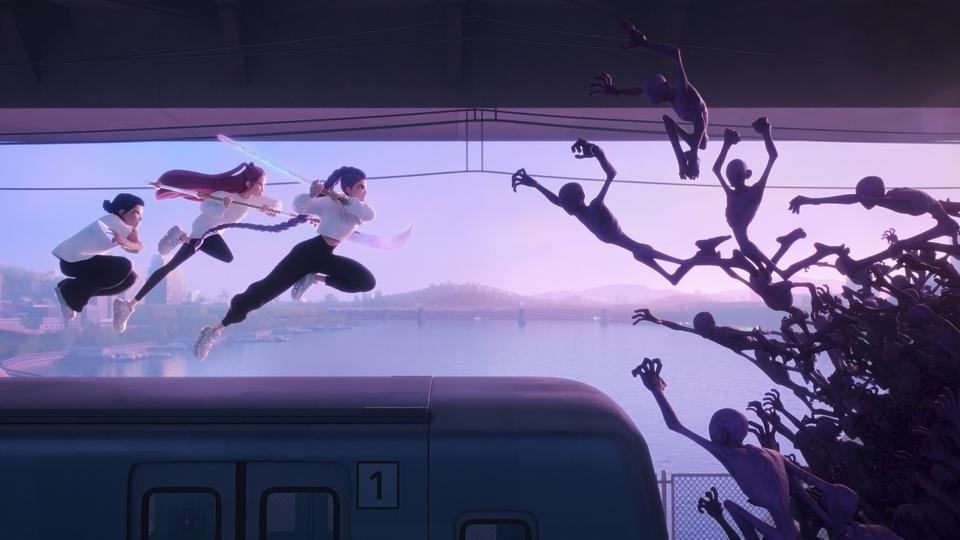 Then enter the Saja Boys–a group of demons disguised as a boy band that threatens to steal Huntrix’s fans so that their souls can be given to Gwi-Ma. In other words, the lesser jihad against the legions of shayateen wages on in the world around us. It is an “externalization of the destitution of the inner state of the soul of that of humanity,”1, which manifests in the global atrocities and ecological crises we witness daily. Even as we face our own internal issues.
Then enter the Saja Boys–a group of demons disguised as a boy band that threatens to steal Huntrix’s fans so that their souls can be given to Gwi-Ma. In other words, the lesser jihad against the legions of shayateen wages on in the world around us. It is an “externalization of the destitution of the inner state of the soul of that of humanity,”1, which manifests in the global atrocities and ecological crises we witness daily. Even as we face our own internal issues.